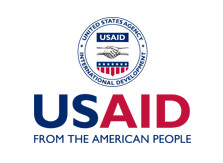|

Minister of Health Professor Eyitayo Lambo flanked by DCDPA Director Dr. Shehu Sule, and COMPASS Senior RH Adviser Dr. Habib Sadauki
|
COMPASS - FMOH partnership works to achieve Millennium Development Goal of improving maternal health care
COMPASS - Abuja, Nigeria [September 2006]
Each year, millions of women, newborns, and children die of preventable causes. In Nigeria, 704 out of 100,000 women die during childbirth. While the interventions that could save their lives are widely known, they are often not available either to health care providers or to those who need them most.
One of the Millennium Development Goals is to improve maternal health care by the year 2015. Concretely, this translates into achieving a 75% drop from the unacceptable levels of maternal mortality registered in 1990. However, this can only be realized through increased availability of cost-effective health care solutions for women and infants.
In collaboration with the COMPASS Project, the Federal Ministry of Health (FMoH) in 2005 launched a campaign to improve the technical skills of health care providers by promoting timely interventions during emergencies and increasing the use of services by pregnant women in Nigerian communities.
“Working closely together in 51 LGAs in Kano, Lagos, Bauchi, and Nasarawa states, as well as the FCT, the partnership has recorded several milestones,” commented COMPASS Senior Reproductive Health Advisor Dr. Habib Sadauki. “More than 2,000 community- and facility-based providers have improved their reproductive health and family planning skills through this collaboration.”
Recognizing the importance of quality standards, COMPASS and the FMoH agreed to update the National Clinical Service Protocol for Obstetric and Neonatal Care. "This task became necessary, since the existing document was outdated and thus no longer helpful in reducing the unacceptably high maternal and infant deaths in the country," said Dr. Shehu Sule, Director of Community Development and Population Activities, FMoH.
It was worth celebrating when the comprehensive, user-friendly document was finally published after a year of research, writing, consultations, and review by a distinguished team of health managers and trainers from Nigerian tertiary institutions, the Nigerian Medical Association, the Nursing and Midwifery Council, Schools of Midwifery, FMoH, and development partners.
COMPASS supported the process by funding the review and printing 2,000 copies of the Protocol for distribution in 700 project-supported health facilities. With support from other donors, the FMoH is planning on producing additional copies for wider distribution across the country.
According to COMPASS Deputy Chief of Party Bola Kusemiju, “The document is invaluable to the groups of health care providers who give obstetric and neonatal care at the various health care levels. It contains detailed, practical instructions on management of common obstetric and neonatal conditions that can be fatal if not handled appropriately and in a timely manner.”
The inclusion of recent advances in obstetric care makes the manual indispensable for health care providers, who may not have had access to other sources of up-to-date information. “Most of the common obstetric and immediate neonatal problems and disorders in Nigeria have been captured in this protocol,” commented Professor O.A. Ladipo, President of the Association for Reproductive and Family Health and a member of the review team. “The appearance of this protocol is timely, and I am convinced that it will serve as a valuable reference text for medical undergraduates and postgraduates, as well as practitioners working in the difficult terrain of developing countries.”
Recommending the Protocol for use by all health care providers during a formal launch in September 2006, the Honorable Minister of Health, Professor Eyitayo Lambo, stated, “Developing a National Clinical Service Protocol for Obstetric Care is within the current health sector reform agenda for quality service provision. It is also in line with our vision of zero tolerance regarding the death of women from pregnancy-related causes.”
Before the official ribbon-cutting, the Honorable Minister applauded COMPASS's achievements, which were highlighted in an earlier presentation. “I noticed with delight how you were able to refurbish a 'so-called' health facility into an ideal health facility.”
COMPASS promotes the use of services by community members in 51 targeted LGAs and improves the working environment for health care providers through health facility renovations and provision of essential equipment, as well as training. With the new Obstetrics and Neonatal Care Protocol, the quality of care will be improved as well.
Optimistic about the relevance of the Protocol in contributing to the reduction of maternal and child deaths, Dr. Sule said, “It is my sincere hope that with the proper implementation and use of this document at the various levels of service delivery, Nigeria will be on course to achieving one of the health-related Millennium Development Goals.”
|
